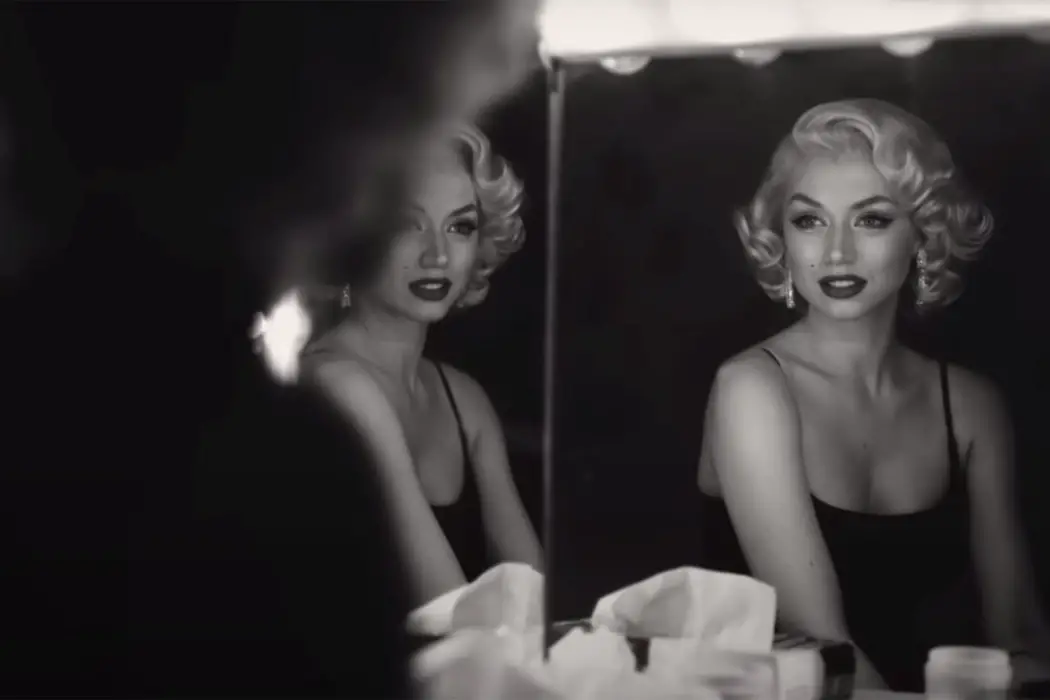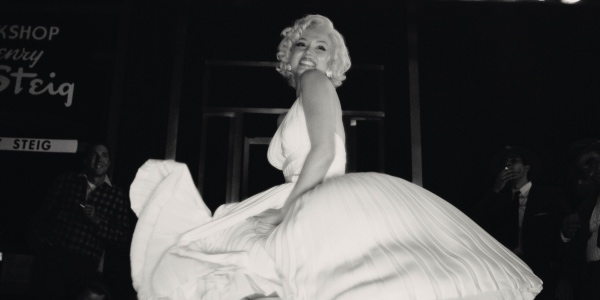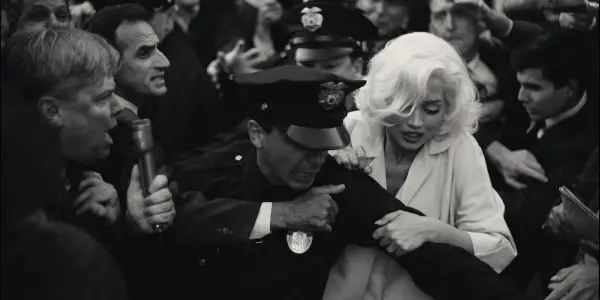BLONDE: Biopic Of The Male Gaze

Stephanie Archer is 39 year old film fanatic living in…
As one of the most highly anticipated films of the year, Andrew Dominik’s Blonde does not live up to expectations. There was a stirring excitement as images of Ana de Armas as Marylin Monroe were released, vibes of last year’s first look at Kristin Stewart as Diana ruminating. The images radiated an awareness, an understanding of a portrayal of Monroe. It was like looking into the past. And as the news that the film received an NC-17 rating emerged, the intrigue only heightened. And while de Armas does manage to capture the famed star, the film itself disappoints, bordering on frustration. In a showcase of misogyny, Blonde proves Marylin Monroe, primarily Norma Jean, is still waiting for someone to truly see her.
Lost From the Start
The issues with Blonde start early on, though where the rest of the film becomes a frustrating depiction of Monroe’s life, the film’s beginning initially struggles to connect with its audience. To its credit, the beginning of Blonde does effectively establish the psychology that would be the basis of Marylin Monroe. Mother’s paranoid schizophrenia and the knowledge of her father in the form of an image and an industry fuels her sense of abandonment, self-esteem and driving force to work in the film industry. Yet while effectively established, there is a lackluster attempt to garner the audience’s sense of empathy, lacking a caressing touch of compassion to these opening moments — a fault that will continue through to the film’s final moments.

It is not until Norma Jean is brought to the orphanage, the young child screaming she is not an orphan and fighting not to be left behind, that the film strikes an emotional cord. Yet as slow as it is to establish, it is just as quick to sever. From this devastating moment, Blonde transitions 10 years later to Monroe’s blossoming career, indicating the time change and this starting point with pictures of her magazine covers and pin-ups. Where this change in the timeline feels an appropriate place to start, the immediate choice of imagery following the previous scenes feels more like a sense of scolding and a cautionary tale. That the only reason that Monroe chose to seize these opportunities was that she was left behind – because she was an orphan. And while this can be debated, the immediate capture of her nudity swiftly establishes the meat in the game — as well as the male gaze of the filmmaker.
Blonde does not hold back either, going from screaming child to pin-ups to the sexual abuse of a movie executive Monroe’s panties drawn down as we watch her face fade away as the deed is done. The film follows with this harsh depiction of the abuse Monroe would receive in the years that followed. The film itself becomes its own sense of invasive abuse, focusing on every moment of nudity that encompassed Monroe’s life, throwing away Norma Jean as much as men, the industry and fans did.

Blonde also struggles with its run time. Already a frustrating venture of misogyny and a prime example of the male gaze, the film does little to justify its almost three-hour run time. Many will find scenes dragging, the camera resting on Armas, though while capturing her breathtaking performance, giving nothing more. In a world of artistic and deeply contemplative biopics, such as Spencer, Elvis, and Rocketman, Blonde sinks under its own weight.
Still Seen through the Male Gaze
From start to finish, Blonde feels like a prime example of the male gaze. As you watch how de Armas is captured on screen, you cannot help but feel as though she is a piece of meat. It also feels as though the film was more concerned at capturing how the men of the time viewed her, leaching out the validity to the film’s biopic approach. Many of the close-ups on those surrounding Monroe are men, producers, executives, and husbands, creating a sense of the world she lived in and those looking into it, but never capturing Monroe. And when women are brought in, there is a scolding nature toward a perceived lack of humbleness and gratitude — “All of us would give an arm to be in your shoes.”

Blonde is heavily focused on the sexual abuse and nudity of Monroe, delivering a hollow representation that only continues the sexualization of Monroe. The film forgets that she was more than a person who was sexually abused and more than just a person who walked around naked. Like the surrounding of men, this nudity and abuse did occur, but the filmmakers forget their compassion, forget that Marylin Monroe was a person rather than a persona. It never feels as though the camera is turning the perspective to how Monroe saw the world around her; rather, we only see how the world, particularly men, saw and still see her, and Blonde sadly joins the ranks of other shallow, impersonal biopics.
Conclusion
Ana de Armas is Marilyn Monroe. She was made for this role and executes it perfectly. Yet she is not enough to save the film, instead being swallowed whole by the male perspective she is constantly surrounded by. Blonde has and will continue to infuriate audiences, yet it is a film that can be studied for not only the continued dominating male gaze, but for the need for women to tell women’s stories.
Have you seen Blonde? What did you think? Let us know in the comments below!
Blonde is now available on Netflix!
Watch Blonde
Does content like this matter to you?
Become a Member and support film journalism. Unlock access to all of Film Inquiry`s great articles. Join a community of like-minded readers who are passionate about cinema - get access to our private members Network, give back to independent filmmakers, and more.













